Key takeaways:
- Effective lobbying involves building genuine relationships with lawmakers, combining personal stories with relevant data to influence policy.
- Grassroots mobilization amplifies collective voices, empowering the community to advocate for their needs and illustrating the industry’s significance.
- Crafting persuasive messages hinges on clarity, emotional resonance, and framing around shared values to connect with varied audiences.
- Follow-up gestures, like thank-you notes, reinforce relationships with legislators and keep communication channels open for future discussions.
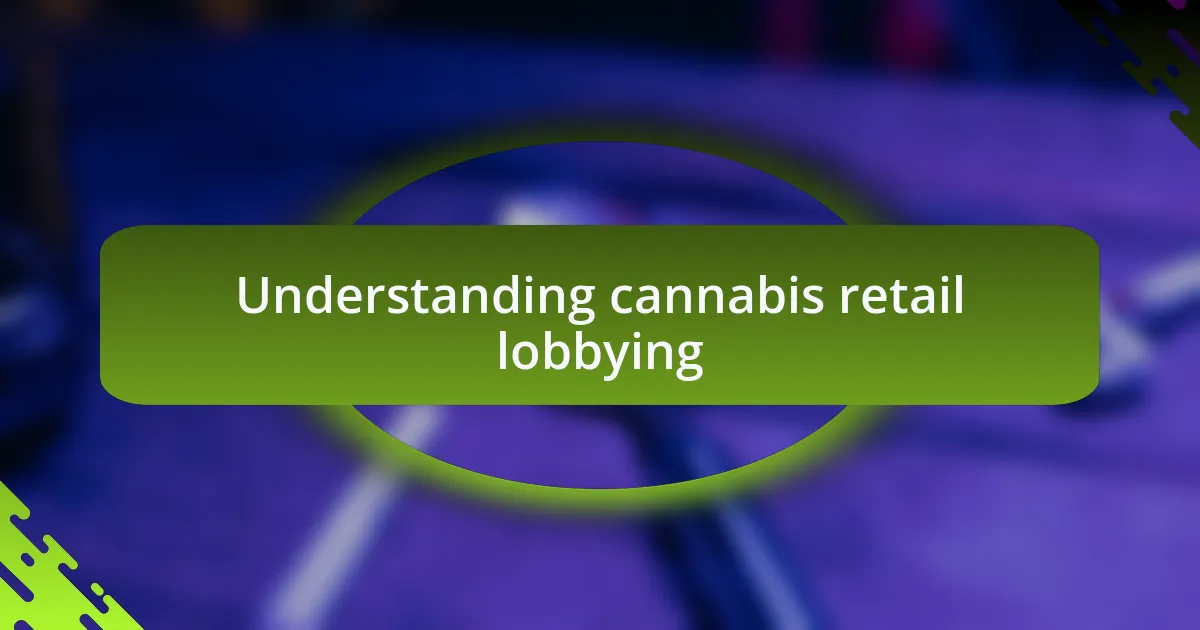
Understanding cannabis retail lobbying
Lobbying in the cannabis retail industry is about more than just influencing legislation; it’s about creating a sustainable environment for businesses to thrive. I recall a time when advocating for more transparent regulations felt almost like a balancing act—juggling the demands of lawmakers while also considering the needs of small business owners like myself. It’s a delicate dance that requires both strategy and empathy.
Understanding the intricacies of cannabis retail lobbying can be overwhelming. I often ask myself, how do I effectively communicate complex ideas to someone who may not fully grasp the nuances of our industry? This question drives me to simplify my message, focusing on relatable stories and shared goals that resonate with both lawmakers and the public. After all, it’s not just about rules; it’s about how those rules affect real lives and businesses.
One essential aspect of this process involves building genuine relationships with legislators and community stakeholders. I remember attending a local town hall meeting where I shared my experiences as a cannabis retailer. The moment I connected a policy change to the potential benefits for our community, I could see the shift in attitude. It reinforced my belief that effective lobbying requires a personal touch—a way to illustrate the true impact of our work beyond statistics and data.
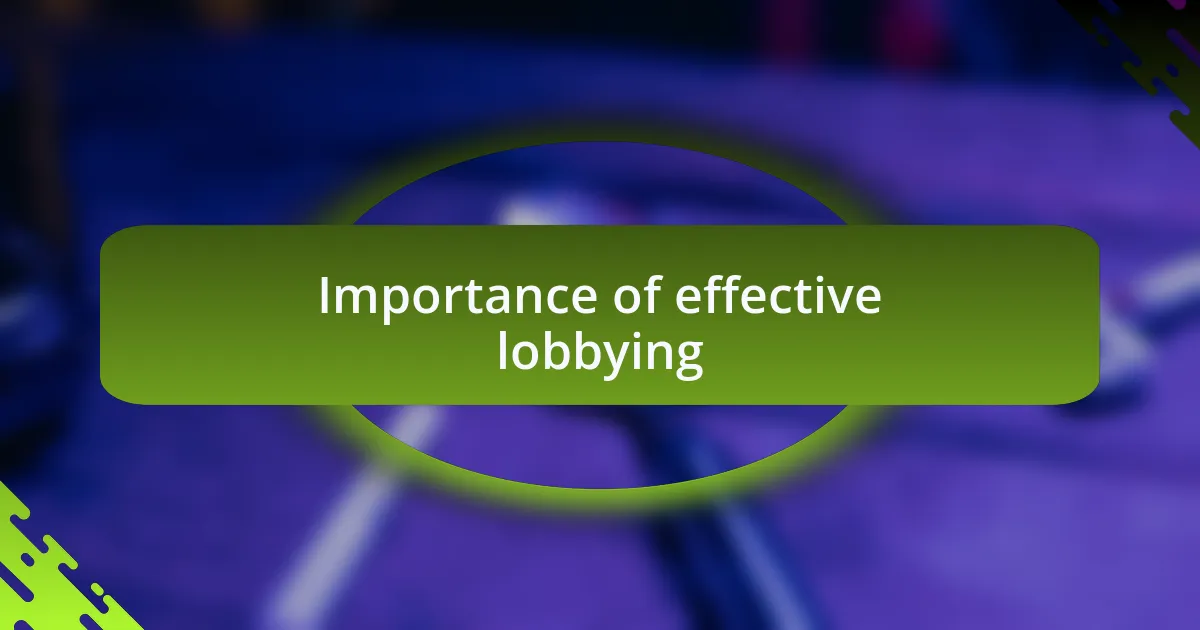
Importance of effective lobbying
Effective lobbying holds the key to not just survival but success in the cannabis retail space. I recall one particularly heated session where I presented data on the economic benefits of cannabis businesses to local governments. Seeing those legislators’ eyes light up as I made the connection to job creation in our town was a pivotal moment for me. It was a reminder that effective lobbying isn’t just about numbers; it’s about inspiring change with relatable narratives that demonstrate our industry’s value.
Moreover, effective lobbying cultivates an environment of trust and collaboration. During a recent discussion with a senator, I shared my dual role as both a business owner and a community member who cares deeply about public health. This personal approach opened a dialogue that went beyond surface-level politics. It felt empowering to turn a formal meeting into a genuine conversation, reinforcing the idea that my voice could influence not just policy but perceptions too.
The urgency of effective lobbying strikes home when I think about the evolving regulations in our sector. I often wonder, how many businesses could falter if we fail to advocate for fair policies? I learned firsthand that being proactive in lobbying can make the difference between prohibitive laws and regulations that foster growth. This realization fuels my passion for advocacy, as I strive to ensure our community thrives amidst change rather than struggles against it.
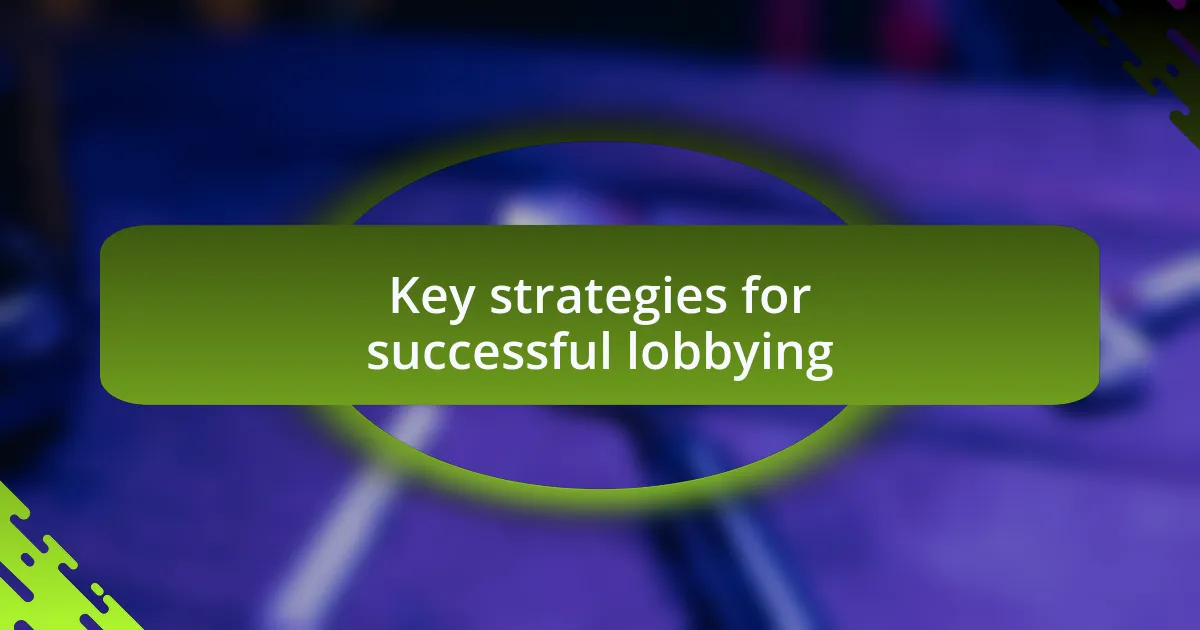
Key strategies for successful lobbying
In my experience, building relationships with legislators is crucial for successful lobbying. I often find that a simple coffee chat can lead to meaningful connections. When I shared a personal story about how my cannabis retail business helped a local family overcome financial hardship, it sparked a genuine interest from a lawmaker who had previously been indifferent. Establishing this human connection can sometimes make all the difference in persuading them to support our cause.
Another effective strategy is grassroots mobilization. When I organized a community event to rally support for cannabis reform, I saw firsthand how collective voices amplify our impact. Engaging community members not only shows policymakers that we care, but it also empowers citizens to advocate for their own needs. Isn’t it amazing how people can unite for a common cause? The energy in that room was palpable, and it reinforced the idea that our voices together hold significant power.
Lastly, leveraging data to support our arguments cannot be overlooked. I remember a pivotal moment when I presented research on cannabis tax revenue potential at a city council meeting. The immediate interest and follow-up questions from attendees revealed the importance of being well-prepared with pertinent facts. It’s one thing to share anecdotes, but backing them up with solid data adds credibility and can sway even the toughest skeptics. In lobbying, it’s all about that balance between storytelling and substantiated claims.
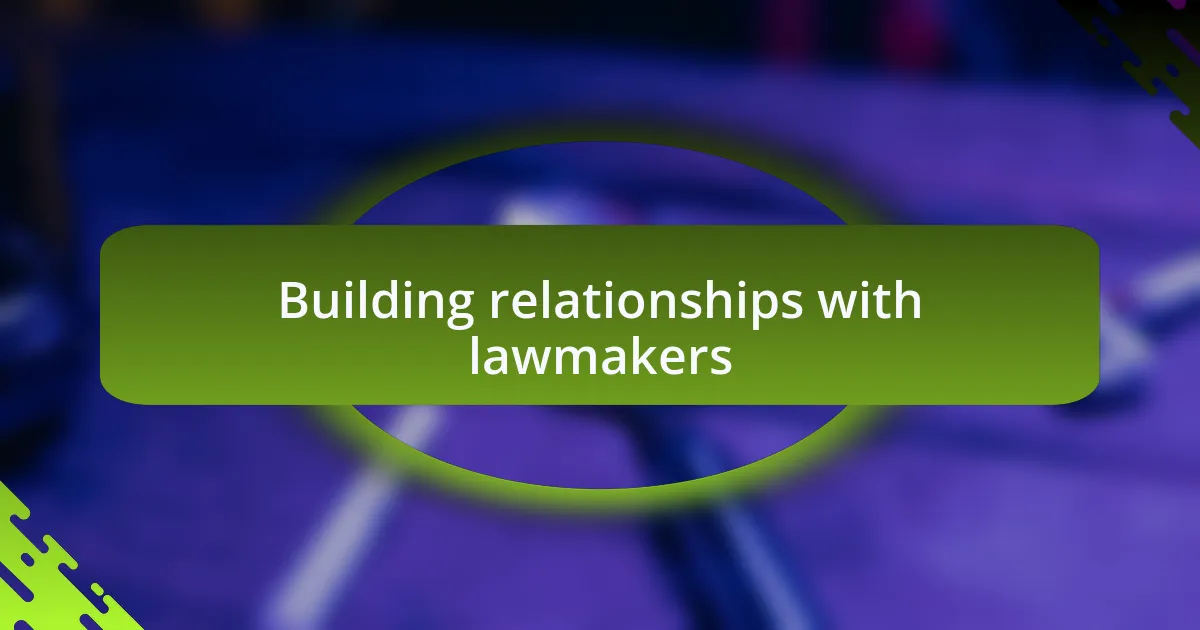
Building relationships with lawmakers
Developing relationships with lawmakers goes beyond mere networking; it’s about nurturing trust and mutual respect. I recall a time when I attended a legislative meeting, intentionally sitting next to an influential lawmaker. We struck up a casual conversation about the evolving cannabis landscape, and before I knew it, we were exchanging insights on regulatory challenges. That moment was transformative, reminding me that lawmakers are people, too, who appreciate genuine dialogue over formalities.
Sharing meals with legislators can create an informal setting that fosters authentic connections. I once invited a local senator to a lunch at my retail store, where we discussed small business struggles. It wasn’t just about the food; it was the atmosphere of openness that led us to bond over shared challenges. That lunch not only strengthened our relationship but has since influenced the senator’s perspective on cannabis policies in our community. Isn’t it interesting how breaking bread can break down barriers?
I always believe it’s essential to follow up after initial interactions. After a meeting where I presented my views on cannabis regulation, I made a point to send a personalized thank-you note. This simple act reminded the lawmaker of our shared conversation and kept the lines of communication open. Sometimes, it’s the little gestures that reinforce relationships in a big way, making lawmakers feel valued and engaged. How often do we overlook these small opportunities to connect?
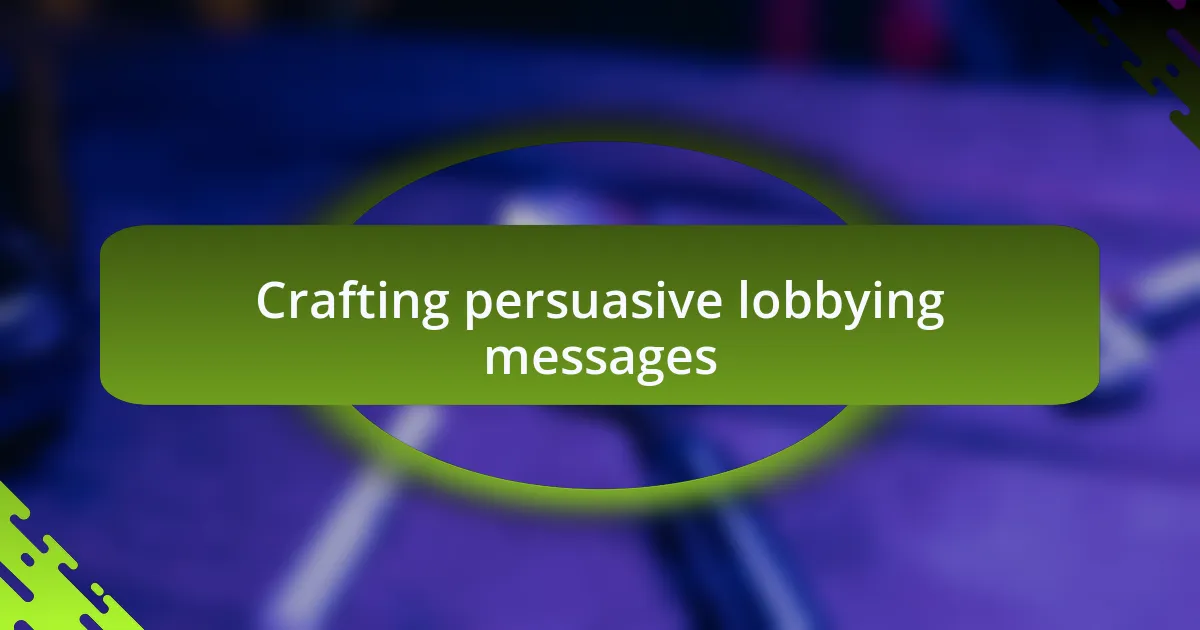
Crafting persuasive lobbying messages
Crafting persuasive lobbying messages requires clarity and emotional resonance. I remember when I was working to advocate for a reform on cannabis access; I wrote a letter to my local representative. Instead of bombarding them with statistics, I shared a story about a patient who found relief through medical cannabis. That narrative struck a chord and ultimately became a pivotal point in my message. Wouldn’t you agree that personal stories can often convey the impact of policies more effectively than numbers alone?
Moreover, it’s crucial to frame your message around shared values. I once faced a challenging conversation with a lawmaker who was hesitant about cannabis reform, so I focused on economic growth and public health benefits. By aligning our discussion with the goals they already cared about, I saw their perspective shift during our exchange. Isn’t it fascinating how emphasizing common ground can bridge seemingly vast divides?
Finally, simplicity in language is vital for effective communication. When I prepared materials for a community meeting, I made it a point to avoid industry jargon that might alienate the audience. Instead, I chose straightforward terms that everyone could relate to. After all, if we’re unable to communicate our ideas clearly, how can we expect to persuade others?
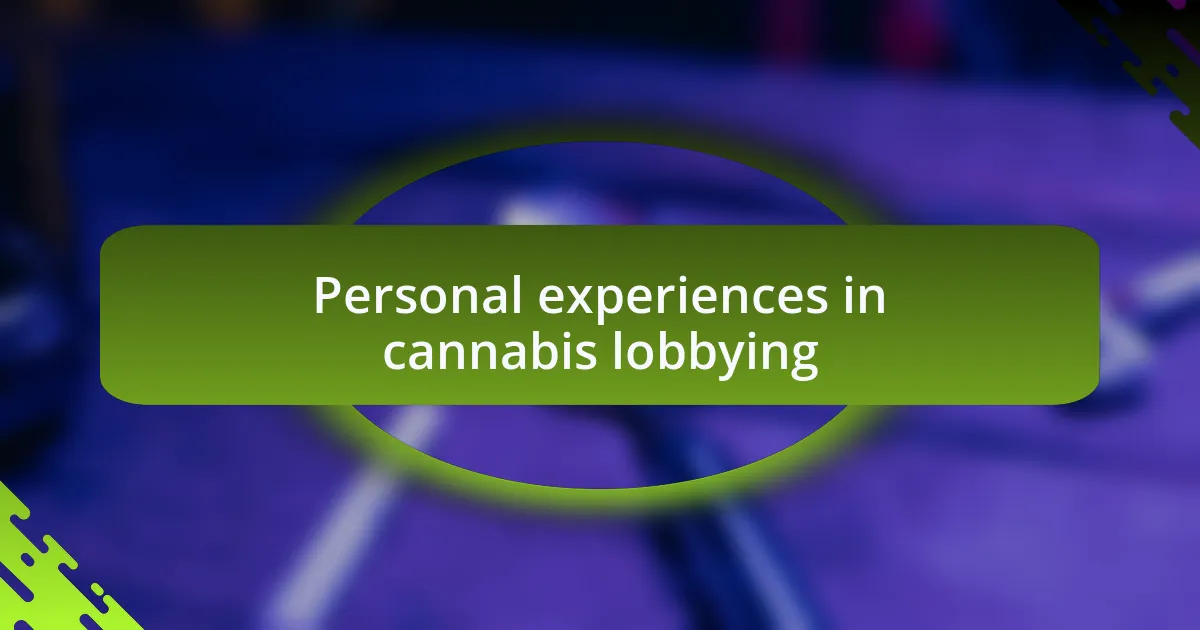
Personal experiences in cannabis lobbying
Navigating cannabis lobbying has been an eye-opening experience for me. I’ll never forget my first visit to the state capitol, standing nervously in the hallway with a group of advocates. We were all united by a passion for change, and when it was finally time to speak with our representatives, I felt a surge of adrenaline. How could I convey the urgency of our cause in just a few minutes?
One time, I joined a coalition of activists preparing for a crucial vote on cannabis regulations. During our brainstorming session, we shared not only facts but also our personal motivations for advocating. I opened up about a family member who suffered from severe pain, and seeing the emotional response from others made me realize how connecting on a human level strengthens our cause. Don’t you think that tapping into our shared experiences can amplify our message?
I’ve also learned the significance of follow-up after meetings with lawmakers. One afternoon, after a lengthy discussion about potential reforms, I took the time to send a heartfelt thank-you note. In it, I included a personal anecdote that tied back to our conversation. Surprisingly, that small gesture opened doors for future discussions. It reinforced my belief: building relationships is just as important as the messages we deliver.